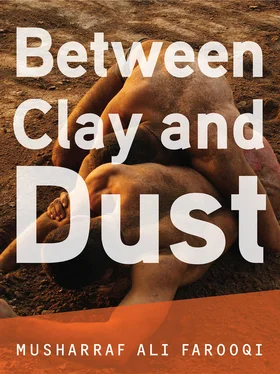“Ustad Ramzi planned it so that Tamami could avoid fighting Imama’s son. Now, neither Ustad Ramzi nor Tamami have a chance against them.”
“Ustad Ramzi had carefully thought it out. He wanted Tamami to earn some prestige by taking on a safe bet. He miscalculated badly in thinking that old Imama would cede easily to an inexperienced pahalwan like Tamami.”
If there was anything that bothered Ustad Ramzi more than the rumors, it was the thought that he had to listen to these imprecations on account of Tamami. Ustad Ramzi was glad that finally he did not have to see Tamami’s face during his own preparations. Tamami kept away from the akhara while he exercised.
Only a few days remained before his bout with Imama.
Nearly half the furniture of Gohar Jan’s kotha had been sold. The rooms from which it had been removed were locked up so that the visitors did not witness the bare walls and floors. But the void and bareness spilled out of the rooms and compounded the emptiness Banday Ali felt from Malka’s absence.
It was only after Malka had left that Banday Ali truly understood how hard it had been for Gohar Jan to constantly wear a mask of indifference and curb the least expression of affection and warmth towards Malka to make sure she did not become emotionally attached to her or the kotha in any way. Atonement was never possible for Gohar Jan. But after Malka’s departure, the guilt of denying her the love she sought exacted a great emotional cost on her; within a fortnight she seemed to have aged many years.
She asked Banday Ali to remove everything that might remind her of Malka. All of Malka’s furniture was locked away in the girl’s room.
Then Gohar Jan took ill and the mehfils at the kotha were cancelled for the first time. Gohar Jan’s physical illness was perhaps her body’s way to staunch her inner suffering. She slowly recuperated and resumed her mehfils. Banday Ali noticed, though, that there were days when she became very quiet and spent hours lying in bed, deep in reflection.
When she informed Banday Ali of her decision to discontinue the mehfils, Banday Ali could only nod silently. Especially in her condition, the long recitals were too exhausting.
Ustad Ramzi was kept away by his preparations for the bout on the day Gohar Jan made the announcement to end the mehfils at her kotha, and he was still away when the last mehfil was held. Banday Ali did not have an opportunity to inform Ustad Ramzi of the change. For a moment he considered sending him a message, but he thought that sooner or later the report would reach him.
Tamami’s defeat by Imama and rumors about the imminent downfall of Ustad Ramzi’s clan seemed to have revived people’s interest in the bout. In contrast to Tamami’s fight with Imama, a bigger crowd had gathered at the exhibition grounds a day before Ustad Ramzi and Imama’s fight to see the trainees from both clans prepare the akhara.
They had cleared the debris from the field and sprinkled the grounds with water to settle the dust. The akhara clay had been turned several times to remove lumps, and later kneaded with turmeric and aromatic herbs. The area was roped off and covered with jute sacks. In the evening the rings for spectators were marked around the akhara with powdered limestone.
The elders of the two clans had decided to keep the entry open for the bout to encourage maximum attendance. Gulab Deen, who visited the site, walked around with a martyr’s look since his services were not engaged for the event.
On the morning of the bout pitchers of sardai, prepared with almonds, milk and herbs, and platters of dried dates were taken to the grounds to be served to the spectators.
In the enclosure Ustad Ramzi put on his fighting drawers. A white turban fumigated with incense was tied on his head by an elder of the clan and his shoulders were draped with a coverlet embroidered with Quranic verses. Tamami and the trainees carried him to the exhibition ground on their shoulders, reciting the qasida burda to solicit an auspicious outcome.
Ustad Ramzi felt a vague foreboding as the procession approached the akhara, but he was pleased to see the large crowd that had gathered to witness the bout.
People filled the expanse of the exhibition grounds and some had climbed on to the boundary walls and the trees to have a better view. A festive mood prevailed among the trainees of the two clans. The two champions entered the exhibition grounds at the same time amid the uproar of their supporters and the crowd. The noisy crowd gradually became silent as the competitors were called for introductions.
When the bout began, Imama opened with defensive play. Ustad Ramzi’s clan cheered at this apparent hint of weakness, but Ustad Ramzi immediately saw Imama’s intention of protracting the fight. A longer bout would be to Imama’s advantage as his younger body would get progressively warmer, more limber, and feel less pain. Ustad Ramzi knew his own stamina would decline in the same proportion, and if he tried to hasten the pace he would spend his energies sooner and make mistakes. He relaxed his mind and prepared himself for a prolonged fight knowing well that his days of epic contests, when he could grapple with opponents for hours, were behind him.
Both pahalwans were tired by the end of the first half-hour. Imama had applied two takedowns successfully, though he came very close to being pinned down once by his rival. Ustad Ramzi had decided not to resist Imama’s strategy for the first several moves, hoping Imama might make mistakes if he realized that Ustad Ramzi had seen through his plan and was not unnerved. But instead of changing his strategy Imama fortified it with prolonged, defensive moves.
Imama was drenched in perspiration, but his breathing was unaffected. Ustad Ramzi’s breath came unevenly now and he knew that it couldn’t have escaped Imama’s notice.
Their next few movements succeeded each other in a flash. Imama lunged forward to apply a takedown. Ustad Ramzi countered it and gripped his rival’s neck. Imama answered with a defensive lock.
After a few moments of remaining thus engaged, Ustad Ramzi felt a severe throbbing in his temples. It became progressively painful. He knew he would not be able to maintain his lock much longer.
Meanwhile, seeing that Imama was unable to break Ustad Ramzi’s hold, the referee conferred with the judges and came over to ask Imama if he wished to disengage. If either of the pahalwans had chosen to disengage, the fight would have been declared a tie. Imama waved his arm angrily in refusal. Respecting his adversary’s wishes, Ustad Ramzi also refused.
Some more time passed. The throbbing in Ustad Ramzi’s temple had now become unbearable. The impatient shouts of the spectators worsened the pain and each pulse felt like a hammer stroke in his skull. Only now he felt conscious of a spasm in his left knee, as if someone had stuck a jagged knife into it. That was the least of his worries because he felt Imama’s body cooling down under him. Imama had not made another move, knowing he was exhausting Ustad Ramzi’s strength just by lying there. Ustad Ramzi realized Imama was marshaling his energies to apply another reversal; he had refused to disengage for good reason.
A few moments later Ustad Ramzi saw one of the elders of Imama’s clan regarding Imama intently. Ustad Ramzi noticed an exchange between him and Imama’s son. Ustad Ramzi was distracted when he noticed that Tamami had moved closer to the akhara. His brother’s anxious gaze settled on Ustad Ramzi who averted his eyes.
Ustad Ramzi again noticed an exchange between Imama and his clan elder who had come closer to see how Imama was holding up. Imama gesticulated furiously a few moments later.
Читать дальше












